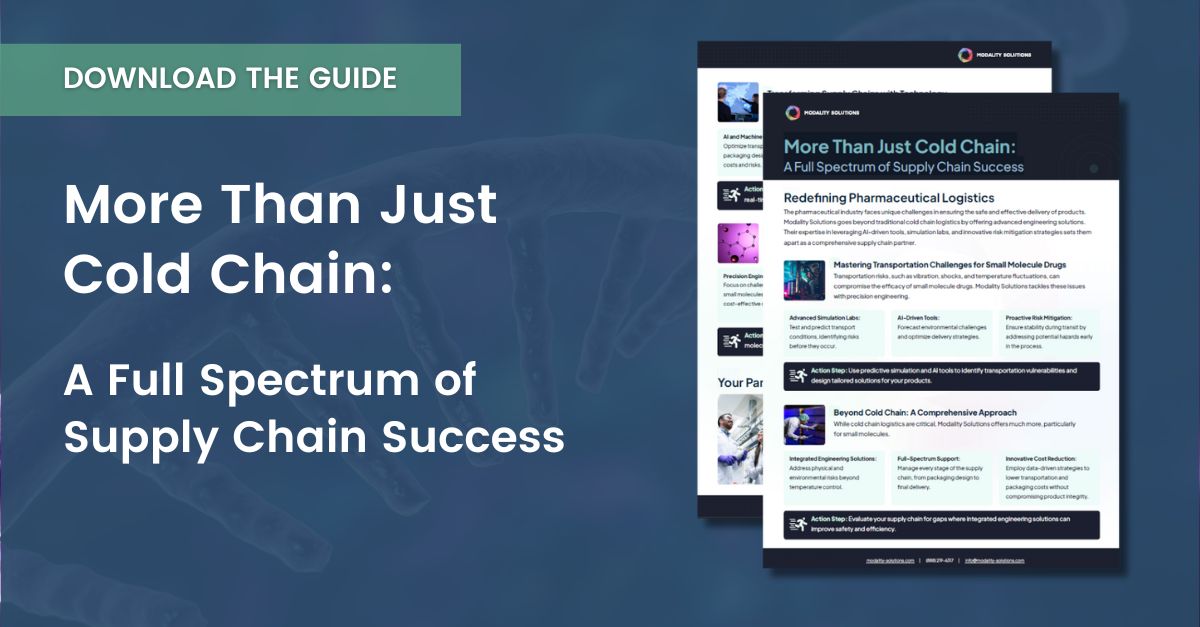No Temperature Controls Necessary For Small Molecules? Are You Sure?
Ensuring Quality for Small Molecule Therapy Supply Chains in a Growing Market Managing the...
read Details

Immunotherapy, the process of strengthening a patient’s own immune system using pharmaceuticals, is rapidly increasing in popularity due to its effectiveness in many previously untreatable diseases. Commonly used to treat cancer, autoimmune diseases, and genetic disorders, these treatments have been incredibly successful for a wide variety of diseases.
However, with more advanced treatment comes a more complex supply chain. Shipping immunotherapy drugs presents unique challenges—most notably because these drugs are time sensitive and personalized for individual patients.
RELATED: Cold Chain Validation Best Practices Including Immunotherapy [WEBINAR]
So what challenges do we continue to face in the supply chain as the development of immunotherapy drugs rapidly evolves? And what opportunities are available to improve supply chain logistics?
One common type of immunotherapy uses monoclonal antibodies. Monoclonal antibodies are usually developed in an animal and then hybridized for use in a human’s immune system.
While these have been successful in treating COVID-19 and many other viruses and diseases, monoclonal antibodies increase fragility due to their size and complexity compared to conventional pharmaceuticals. They are particularly sensitive to shock and vibration and are easily denatured if exposed to temperatures outside of a very tight range.
As a result, additional precautions around shipping include cushioning packaging and extensive thermal insulation. Furthermore, the antibodies are studied against their shipping conditions in qualification studies, where they are exposed to conditions typically encountered during the logistics process.
Another challenge that companies face is the supply chain and logistics for T-cell therapies. In typical pharmaceutical manufacturing, the drug product is produced and manufactured in a plant and then stored and shipped to a determined location to be sold and used. However, for T-cell immunotherapy, the “supply chain” starts with the patient when their blood is drawn.
The blood is then shipped from a blood collection center to a specific lab where the cells are changed to be able to fight a specific disease, and then returned to the hospital to inject back into the patient. Shipping blood products is very challenging for several reasons. Blood products are sensitive to environmental factors such as temperature, shock, and vibration. They are perishable and must be shipped in accordance with Category B infectious substance federal regulations.
Immunotherapy drugs are personalized for each patient based on their own antibodies, shifting the typical manufacturing step in the supply chain. The use of the immunotherapy process adds another challenge because it can be very time sensitive. The diseases being treated can progress rapidly, requiring an effective and efficient supply chain and logistics.
Immunotherapy products need packaging that protects them from the expected hazards during shipping, and the methods by which they are shipped is usually as fast as possible. These products also sometimes need to be stored in deep frozen temperatures, which by itself requires unique shipping solutions that utilize liquid nitrogen in membranes to maintain temperature.
With T-cell therapies in particular, there is a limited supply, adding more risk to the process. Normally, if drug product is lost due to a problem in the supply chain & logistics for any reason, there is more supply available. With T-cell therapies, the supply is limited to the amount of blood that the patient can give, which is often even more limited with an ill patient.
Modality Solutions conducts risk assessments with immunotherapy supply chains and determines where the highest risk activities take place. If a shipment is lost, it can be a very long time before another batch can be made. The immunotherapy process is also extremely expensive as there is no scaling up that can be done due to the treatment being specific to the individual.
Maintaining control of the supply chain & logistics for immunotherapies, where the allowed conditions are even more strict than normal, is very difficult. Immunotherapy drugs add risk due to the circumstances where these therapies are used.
Modality Solutions has assisted several clients that utilize monoclonal antibody treatments. For these clients, Modality Solutions writes a validation master plan (VMP), then conducts risk assessments utilizing HAZOP (Hazard and Operability Study) methodology and develops mitigation strategies in accordance with the plan.
The HAZOP methodology identifies what the risks to a supply chain are, and then analyzes them based on severity, likelihood of occurrence, and chance of detection. With immunotherapies, the overall severity of any errors is high, which is why the HAZOP methodology is better at identifying the risks that need to be mitigated.
Using these tools, Modality Solutions helps ensure safe shipment of immunotherapy treatment. Contact our team to learn more.
Ensuring Quality for Small Molecule Therapy Supply Chains in a Growing Market Managing the...
read Details
Ensuring the safe, effective delivery of small molecule drugs is more challenging than ever....
read Details
At a Glance: Cold Chain Engineering: Modality Solutions focuses on enhancing drug delivery through...
read Details